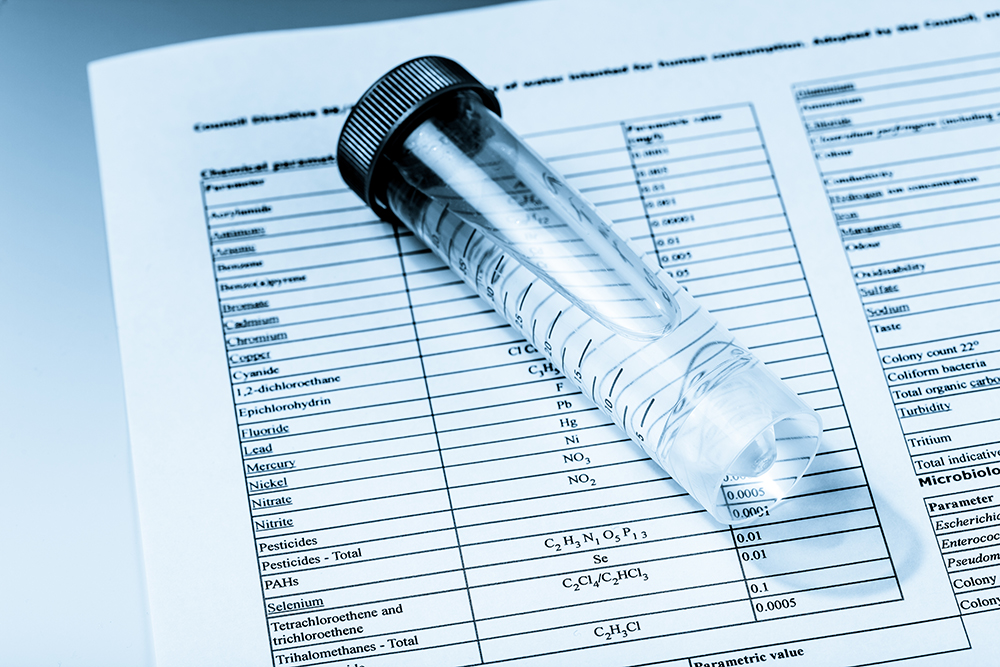You’ve finally found “the one” and it’s time to have a home inspection where you’ll inevitably learn more about the property, the condition of appliances and what responsibilities you’ll be taking on if you purchase it. While a professional home inspection is typically quite thorough, water testing isn’t always a part of one. Some states do not require an analysis of the water quality for real estate transactions and others only require the bare minimum of testing for bacteria if the water is coming from a well. But that doesn’t mean you shouldn’t arrange to have one completed by a water treatment professional.
Having your potential new home’s water tested before you make the purchase is highly beneficial. You’ll learn how hard the water is, if there is any iron present that will lead to hours spent scrubbing the rust stains from the sink, and what other contaminants may be in your water. Knowing what’s in your water will help you determine anything you may need in terms of water treatment equipment to correct these issues, or to evaluate any existing systems that may be installed in the home to ensure they are working properly.
Factors That Affect a Home’s Water Quality
Several variables impact a home’s water quality. If the property has a private well, the condition of the water is completely the homeowner’s responsibility since it doesn’t pass through any sort of filtering the way city water does. Wells must be thoroughly maintained, or you may be inviting a wide range of contaminants to enter your water supply through cracks or other openings, from pests and rodents to harmful bacteria and pollutants.
If the home you’re considering uses municipal water, the water passes through rigorous filtering at the city’s water plant. However, even city water can collect a variety of contaminants while it travels to your home, including lead from any old plumbing infrastructure used throughout the town. Plus, cities will only filter out the issues that affect the health and safety of their residents. Hard water minerals are not removed by the city and while it can’t hurt you and your family, it can damage some of those new water-using appliances you plan on purchasing for the new house.
The geographic region where your home resides will also impact what’s in your water. Some regions have more hardness in the water while others may contain higher levels of contaminants like lead, manganese or iron. Homes near airports and industrial areas could also contain dangerous PFOA chemicals that get into wells or city water pipes.
The age of the home, as well as the age and condition of any existing treatment equipment can also play a role in a home’s water quality and the potential costs associated with improving it. Maybe the home already has older water treatment equipment but it’s not as effective as it could be. Make sure to check the condition of this equipment to understand if the previous homeowners had been keeping it properly maintained and how much life is left before you may need to replace it.

Use Water Test Results as a Budgeting Guide
Having your water tested by a professional will give you a thorough understanding of the home’s water condition and will help you understand the options available to improve the quality. A qualified water treatment professional can provide equipment recommendations and costs which will be helpful when budgeting for your new home.
Knowing the cost of water treatment equipment can work to your advantage when negotiating the price of the property with the seller. You can request the current homeowners make upgrades, remedy any situations that may negatively impact your health, or you could always request a price reduction to help you cover the costs.
During the home inspection phase of buying a home, you will want to learn as much as you can about potential fixes and costs related to a home, so you don’t face unexpected expenses after you’ve moved in. Water quality and equipment should definitely be a part of those considerations.
An Investment That Pays for Itself
Having to install water treatment equipment such as a water softener, filters or a reverse osmosis system is an upfront expense but, over time, can actually save you money.
For example, water softeners eliminate hardness that inhibits the efficacy of soaps and other cleansers. With soft water, you can use less cleaning product and detergent saving you money. Soft water also reduces scale build-up in appliances such as water heaters and dishwashers, prolonging their lifespan. Eliminating hardness from your water is also better for fabrics so clothing will stay in good condition longer.
With drinking water systems like reverse osmosis, you’ll likely never need to buy bottled water for your home again. At an average cost of around $1.50 per bottle, the expense of using bottled water as your home’s drinking water adds up quickly. An RO provides the cleanest drinking water right on tap in your kitchen eliminating unnecessary expense and it’s better for the environment.
Better Late Than Never to Have Quality Water
So, maybe you’ve already purchased a home and have discovered that the water is less than ideal. Testing and treating the water are still vital steps to take at any point of your residency. Analyze your home improvement budget and consider prioritizing water quality to help make your life more comfortable. After all, water isn’t just an aesthetic or functional part of your home, it’s something that can save you money and more importantly, directly affects the health of you and your family.


